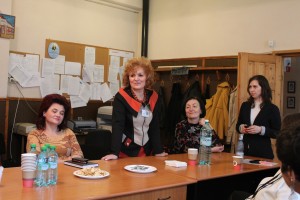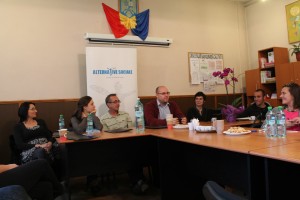Iasi Meeting, a focus on distant parenthood and the services provided to children left behind.
The sixth Grundtvig national meeting was held in Iasi, Romania organized by Alternative Sociale Association (AAS), an NGO working with migrant children and families, children with parents in detention and on career guidance.
In particular the association has been focusing for over ten years on children affected by migration, including children left behind and returning children. They realized researches, training for professionals, awareness raising campaigns and they implemented advocacy activities.
In Iasi, the second most populous city in Romanian capital of Moldavian Region, Grundtvig Partners attended to meetings with key stakeholders working with children and parents involved in migratory events: educators, volunteers, School Directors, Social services and Police Borders
First they visited Ion Simonescu school where AAS implements, in collaboration with Fondazione L’Albero della Vita, a project to support children affected by migration through the creation of Youth centers in schools. The project “Family on the move: protecting transnational rights in Europe-ROMANIA” creates a referral mechanism to identify children returning from a migration experience in needs of special assistance.
At the meeting participated the school director, voluntary teachers and youngvolunteers and the project coordinator. In the  school children affected by migration are numerous; in the last decade teachers realized that the departures of one or both parents affect the children behavior and schools performances. The Youth center has become an attractive place where leisure activities enforce life skills and help to develop self-esteem. The teachers explained that they see the positive results of the children’s participation to the Youth Center activities: those with relational problems became more open and participating, others learned to follow rules, tempering their behavior, as reported by the project volunteers.
school children affected by migration are numerous; in the last decade teachers realized that the departures of one or both parents affect the children behavior and schools performances. The Youth center has become an attractive place where leisure activities enforce life skills and help to develop self-esteem. The teachers explained that they see the positive results of the children’s participation to the Youth Center activities: those with relational problems became more open and participating, others learned to follow rules, tempering their behavior, as reported by the project volunteers.
Grundtvig partners visited the Social Integration Center (SCI) of the Iasi County Child Protection Department (CCPD), in order to meet child protection professionals of the department. The Center intervenes in different area related to child protection: home alone children, remigrant children, victims of trafficking etc. The specialists of the SIC implement activities that are oriented towards children (risk prevention, raise awareness) but also towards the staff of the CCPD (vocational training and capacity buildings).
The CCPD oversees approximately 4000 children affected by migration in the county of Iasi – which is only part of the total number of children in this situation, since not all cases are referred to the CCPD. One of the psychologists affirmed that her perception is that the phenomenon of “home alone” children is not reduced but actually raising although they possess more skills and tools to support Transnational Families.
Finally, AAS organized a meeting with stakeholders at the School for the Initial and Ongoing Training of the Border Police Personnel (SIOTBPP). The visit was an opportunity to meet the management of the School (in charge of training) but also representatives of the Iasi Territorial Border Police Inspectorate (in charge of securing the border).
In order to develop their training curricula the School conducts needs assessments among the beneficiaries on transversal issues such as: human rights and illegal migration, management.
AAS collaborates with the border police on in the elaboration of trainings on different topics: the identification and assistance of the victims of trafficking, the management of the police activity or trainings on media relations. They offered to partners also a view of the main issues they face in their daily work on the internal borders (Hungary and Bulgaria) and external borders (Ukraine, Moldavia and Serbia), including the influences of the political situation in the region.
Iasi meeting was a opportunity for partners to have an in depth view on the work of different key stakeholders coping with transnational families and migration interviewing them and visiting AAS project.


